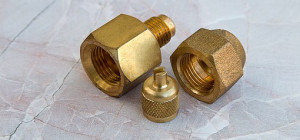 When you think about your toaster oven, you don’t automatically think: danger! You may not have known this, but some 12,000 homes in Canada alone catch fire per year due to internal sources – i.e, your household appliances. That’s right. While your household appliances aren’t inherently dangerous so long as you do any required maintenance on a consistent basis and clean them out as is necessary, too few homeowners recognize the importance of regular care. You can greatly minimize the risk of fire by keeping an eye on your appliances and maintaining when needed.
When you think about your toaster oven, you don’t automatically think: danger! You may not have known this, but some 12,000 homes in Canada alone catch fire per year due to internal sources – i.e, your household appliances. That’s right. While your household appliances aren’t inherently dangerous so long as you do any required maintenance on a consistent basis and clean them out as is necessary, too few homeowners recognize the importance of regular care. You can greatly minimize the risk of fire by keeping an eye on your appliances and maintaining when needed.
Regina home insurance experts point out that while your home policy will (generally) cover unexpected disasters, such as if your dishwasher malfunctions unexpectedly and causes severe water damage to your kitchen and lower floors, but not damages that come of lack of maintenance. As the homeowner, you are expected to care for your home – which includes routine care, cleaning, and inspections for your household appliances.
Here are 8 of the most dangerous appliances that might be in your home right now.
Dishwasher.
Your dishwasher utilizes a control panel to function which, when mixed with water, can be hazardous. Not only does your dishwasher put you at risk of an unexpected leak or water loss, but if something breaks and causes water to enter the electrical parts of your appliance, the defective components could catch fire.
Ovens and stovetops.
Too many people leave food unattended when cooking. Food that overheats, whether because it’s left too long, because a setting was put too high, or simply because the oven has malfunctioned, may catch fire and rapidly spiral out of control. Try to avoid using your oven’s self-cleaning feature too much as well, as this will turn your oven on to extreme temperatures and burn off excess food. Over time, this can slowly damage your oven and potentially cause it to malfunction.
Stovetops are also a hazard, especially due to misconceptions around grease fires. If a grease fire does occur, do not put it out with water as this will only cause the grease to splatter and for the fire to worsen. Instead, smother it and turn off the burner.
Power bars.
Power bars are a huge fire hazard risk. They can malfunction, frayed wires can spark, and if placed too near to a carpet, rug, or other appliance, they can become a significant fire hazard. Avoid putting your power bars near wet environments and do not let them run across/under carpets or other furniture. Regularly check wires to ensure they aren’t damaged.
Microwaves.
Microwaves can be a fire hazard if there’s a wiring fail, if food catches fire, or if metal is placed inside. Metal heats up quickly and can cause your microwave or toaster oven to explode. Always keep an eye on any food that you have left cooking and remember to be cautious about what you place inside.
Refrigerator.
Without regular maintenance, your refrigerator could become a hazard if there’s any faulty wiring or a lightbulb that refuses to turn off when the fridge is closed. Broken compressors can also be a hazard. If a fire does break out, it can easily spread to other appliances/areas of your home and ruin any food inside.
How do you prevent fire?
Most home fires can be prevented by following simple safety precautions. Consider the following:
- Ensure that fire extinguishers are stored where they are easiest to access.
- Never leave cooking food unattended and stay in the kitchen when food is in the oven or on the stovetop.
- Make sure that your family is aware of what to do in the event of an emergency.
- Purchase and install smoke alarms for every room and replace their batteries regularly.
- All appliances that are not in-use should be unplugged.
- If you suspect an appliance may be malfunctioning, hire a professional to look.
Sometimes, accidents do home. Note that your home insurance will cover you so long as the fire that occurred was “sudden” and “abrupt.” Discuss with your insurance broker if you aren’t sure about what is covered under your policy.







